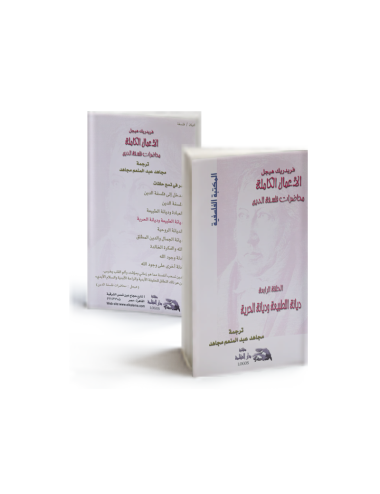History of Aesthetics
Man creates masterpieces of literature and art, but he does not want to be satisfied with this, but rather he wants to understand what is behind his creativity.
0.142 kg - 200 kg
Man creates masterpieces of literature and art, but he does not want to be satisfied with this, but rather he wants to understand what is behind his creativity.
The higher is also the deepest, and in it the separate moments are grouped together in the subsequent pigmentation of the subjective unity, the need for the interconnectedness that characterizes directness is eliminated, and the separate moments are returned to the subjective unity.
Where does joy fit into those moments?
In Choose Joy, acclaimed author and Christian leader Kay Warren shares the path to experiencing soul-satisfying joy no matter what you're going through. Joy is deeper than happiness, lasts longer than excitement, and is more satisfying than pleasure and thrills. Joy is richer. Fuller. And it's far more accessible than you've thought.
For Hegel, thought is not philosophical if it is not also religious. Both religion and philosophy have a common object and share the same content, for both are concerned with the inherent unity of all things. Hegel's doctrine of God provides the means for understanding this fundamental relationship. Although Hegel stated that God is absolute Spirit and Christianity is the absolute religion, the compatibility of Hegel's doctrine of God with Christian theology has been a matter of continuing and closely argued debate. Williamson's book provides a significant contribution to this ongoing discussion through a systematic study of Hegel's concept of God.
The martyrdom operations occupy an important position in the guerrilla action. Indeed, there is no exaggeration in considering these operations to be synonymous with this action. It is not true that martyrdom is based on religious forces
The normal, eternal, absolute idea - in its eternal existence - in and of itself - is God in his eternity or eternity before the creation of the world, and outside the world.
The main characteristic here is subjectivity as a self-determining force - and this subjectivity and rational power that we have met before in the form of the one who has not yet been defined within himself and whose goal - as it appears in the realm of reality - is in this the most specific thing possible.
The separation of religion from the subject manifests itself in the emergence of an actual will. In the will I am an actual and free being, and I present myself against the subject as another, in order to represent it with myself by removing it from that state of separation.
And what after God has honored me, by virtue of my profession as a psychiatrist, with more than half a century of experience, is it right for me to keep all this to myself? As I offer my knowledge and experience to my patients - and as much as possible - I have resolved to present all this in a book, which is a mutual conversation between me and the other party, which is you, the generous reader, so that you may benefit from it by the grace of God, and perhaps also benefit those around you.
The world houses people equally with natural things. When the world is thus treated as a gathering or even a gathering of natural things, it is not conceived as nature, and we do not understand that it is something that is in itself a holistic system, a system of regulations and arrangements, especially laws.
This is the first of two volumes of the only English edition of Hegel's Aesthetics, the work in which he gives full expression to his seminal











